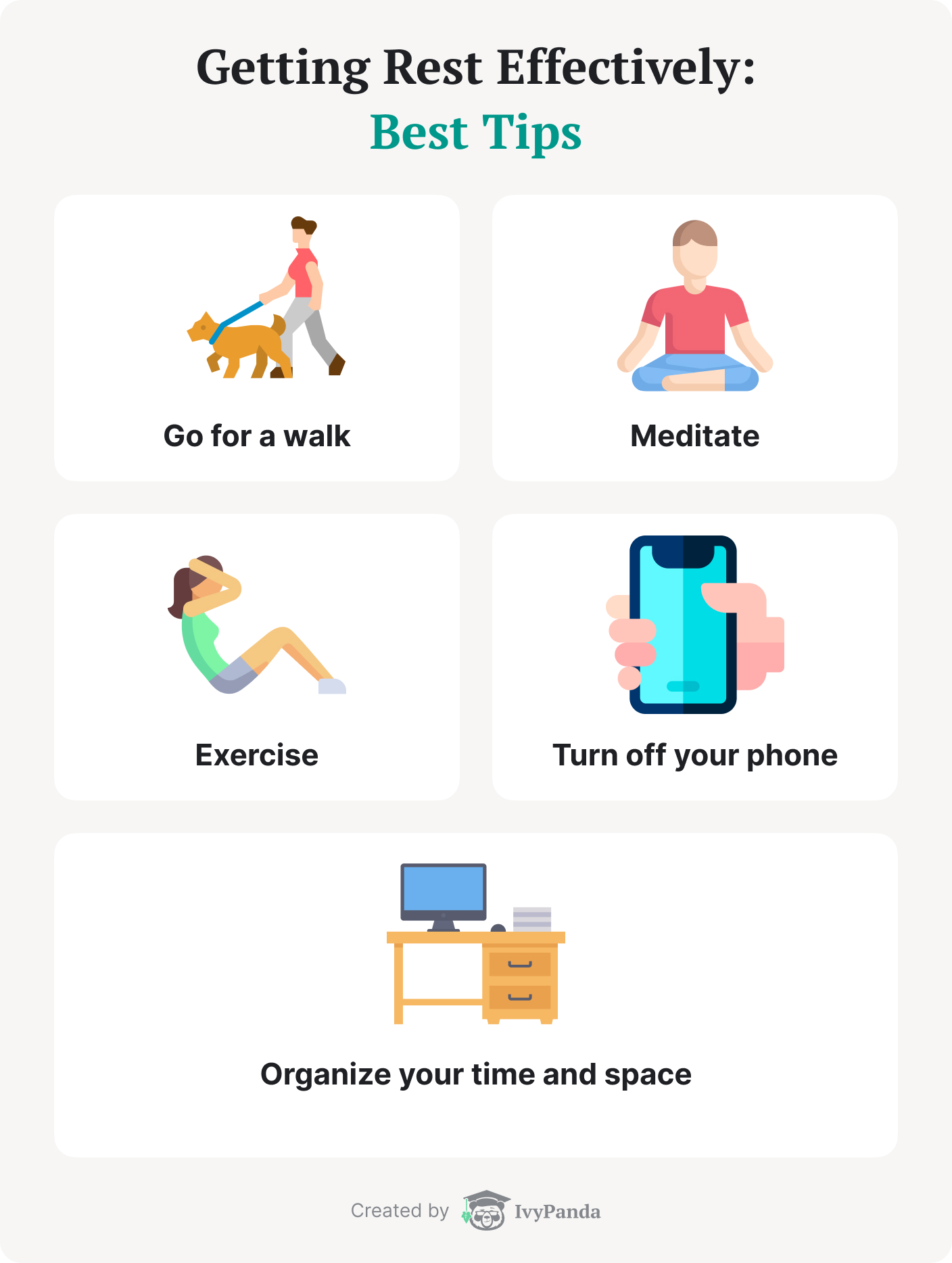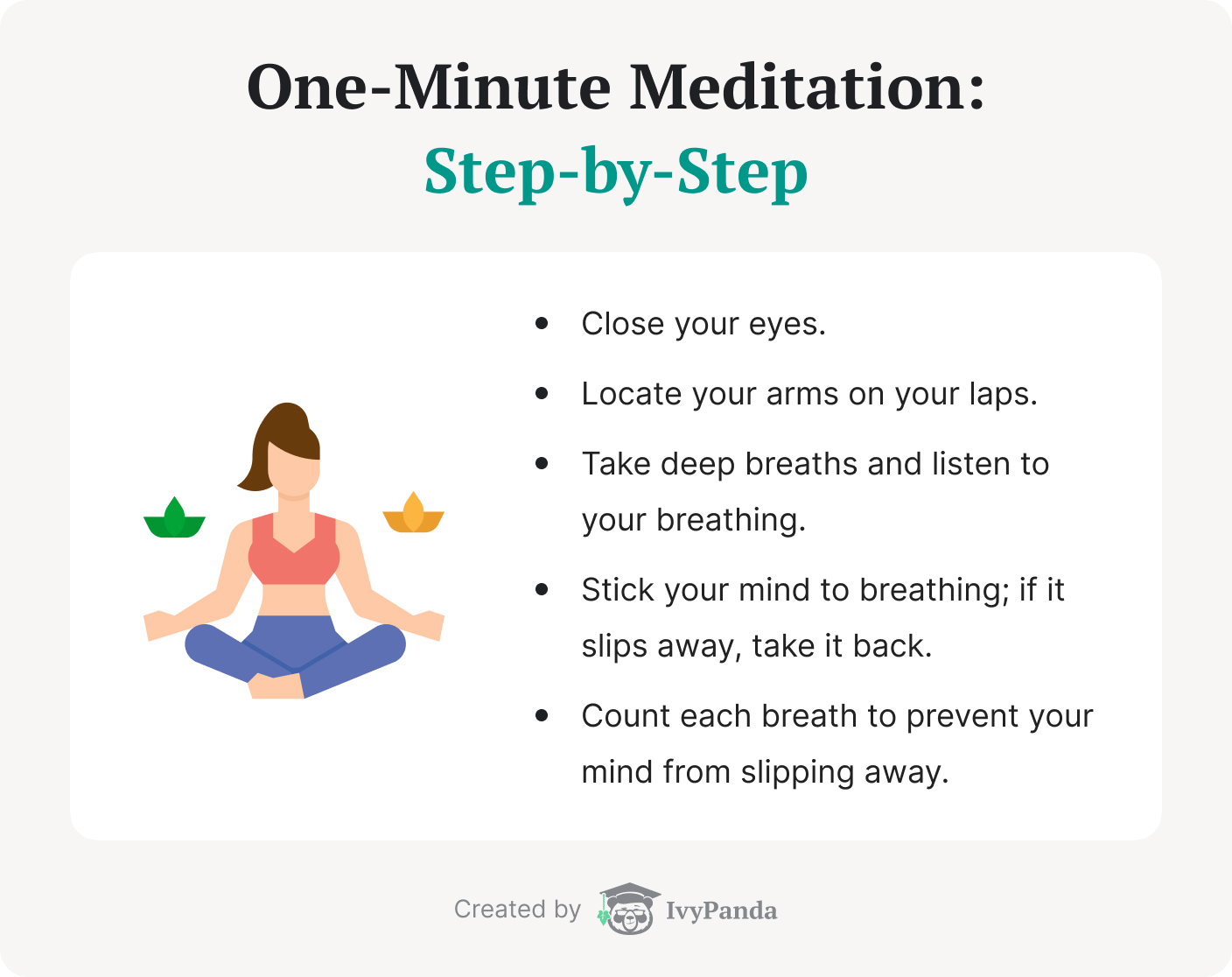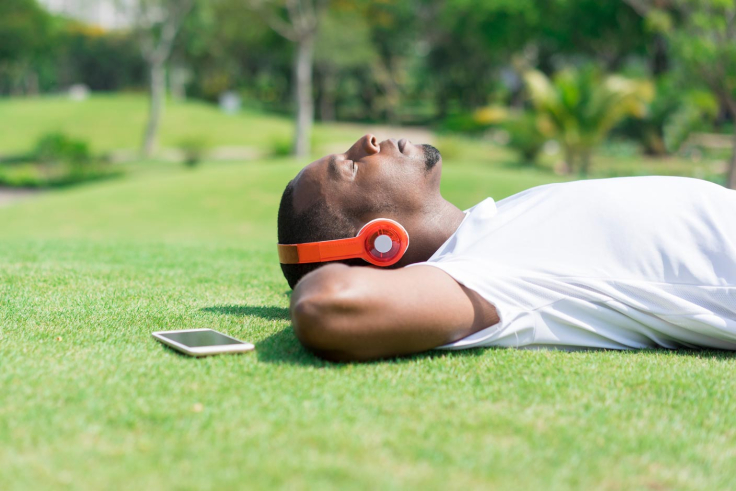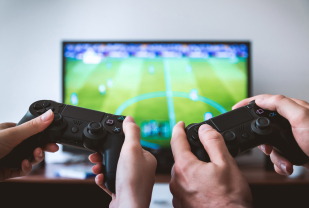Any kind of repetitive work requires an effective rest, but often our busy lifestyles leave little room for good recovery. With endless to-do lists and constant deadlines, many students and professionals struggle to find time to properly rest their bodies and minds. However, it is essential to take a pause in order to maintain productivity, creativity, and overall well-being.
In this article, we’ll uncover the secrets of best practices for effective rest and offer practical strategies to help you manage your energy and achieve balance. Here, you will earn:
- How to rest effectively for your mind
- How to properly rest your body
After following our tips, you will see that even on the busiest of days, you can recharge and perform at your best.

📴 Get off Social Media
Many people instinctively open their social network apps as soon as they have a spare moment. This is not a healthy way to relax. We will explain why it’s better not to stare at your phone during your rest breaks.
So, what is the harm of using social networks during a work or study break?
- Your brain doesn’t rest. Television, video games, movies, and social media are artificial stimulation. When you engage in these activities, your brain is not resting. It is being bombarded with information (even if it is entertaining) and becoming even more tired. Since your brain is also a muscle, it needs time to relax. Allow it to rest so that it can decently perform when you need it to engage.
- You get stressed. Since social media is so widespread and accessible, we often feel like we need to frequently check our newsfeed. This feeling of obligation can increase the amount of the stress hormone cortisol in our bodies. A rise in cortisol levels can lead to memory problems or even depression. Generally speaking, the more you stay off social media, the less stressed you feel.
- Social media keeps you awake. It is quite common to scroll through the phones before going to sleep. You might not even notice how one or two hours quickly pass by. Instead of checking social media before falling asleep, try reading a book or meditating.
- You get bored. Spending so much time on social media can be stressful – or tedious. Mindlessly scrolling through your newsfeed can become pretty boring pretty quickly. You might try engaging in other activities in which your brain is challenged at a comfortable level, like reading a book or solving a crossword puzzle.
- Focusing on yourself becomes difficult. In the following sections, we’ll explain in more detail why focusing on yourself is crucial during a study or work break. Social networks bring your attention to others. Reading comments and looking at pictures of other people makes it difficult to develop and understand your own opinions. Once you stop focusing on others, you’ll find out more about yourself.
On that note:
We are not advising you to stop using social networks entirely – that’s a topic for another discussion. However, we do encourage you to limit your time on the Internet during a school or work break. It is vital to let your brain rest if you want to maintain your motivation and productivity.
🏋️ Exercise or Hit a Gym
Now, we can move on to more practical advice. Specifically, how you can occupy yourself during your rest time in the absence of social networks and the Internet. Our first piece of advice is to engage in physical activities.
What are the benefits of practicing sports? Read on to find out.
For the reasons listed above, we recommend you hit a gym during lunch. Yet, it may be impossible, especially today. So, here are some tips on exercising at home:
- Schedule your workouts. Time management teaches us that it is essential to plan our activities for the week. When you have set aside a specific time, you’ll be more motivated to follow through with your goals. If you’re not sure how to plan a training routine, look at a few examples of good workout schedules.
- Find a proper exercise location. Choose a corner in your house to do your workout that is at least be the size of a yoga mat. When considering a space, remember not to choose the same room where you eat or sleep. That way, you won’t be tempted to stop for a quick snack or watch a bit of Netflix.
- Adjust your goals. When you begin exercising, you shouldn’t jump right into heaving lifting. Start slowly and always listen to your body. Remember, if you want to enjoy your rest, don’t push yourself too much.
- Pick ten exercises per workout. Choose ten main exercises with different intensity levels. You might want to do jumping jacks, along with other, simpler activities. Also, try adding core exercises, strength training, and some stretching.
- Set a timer. Beginners might spend less time on an exercise than those at an advanced level. Remember not to push it too much. This is a time to move your body comfortably and let your brain rest. So turn on your favorite song and start your warm-up.
And enjoy your workout! You can find more information on exercising in our essays database, which contains plenty of papers on this topic.
🚶 Go for a Walk
You don’t like doing high-intensity exercise during your rest periods? We have an alternative for you – go for a walk! This activity will help you refresh your brain and your whole body. Don’t worry; we’ll explain why it is worth doing.
Five prime reasons to take a walk:
- You’ll get more productive. As it comes to midday, people tend to lose concentration and motivation to accomplish the goals. Therefore, it will be beneficial to take a short walk after lunch. You will notice how your mind and body refresh, and your productivity increases.
- Walking improves your mood. Did you know that your organism releases endorphins as you’re physically active? That’s why your mood boosts when you go for a walk. Just imagine, you become happier with every step!
- It helps with your sleep. Sleep deprivation is probably the most common problem among busy people. A simple solution to this problem is to take a walk during the day or before going to bed. The quality of your sleep will noticeably improve.
- It’s easy and relaxing. You don’t need to put extra effort to perform this activity. All you need to do is to get up and go outside. Simple as that! Yet, you will notice how your body becomes more balanced, and your brain gets refreshed.
- You’ll get healthier. A sedentary lifestyle may lead to numerous adverse consequences for your health. Life is all about movement – keep that in mind! So, incorporate a short walk into your daily routine. It will let you stay fit and, more importantly, prevent chronic diseases like diabetes, high blood pressure, etc.
Have you already included walks in your daily schedule? Then, we have more valuable insights for you. Discover some essential tips that will help you benefit from going outside:
- Go to a park.
If you want to let your brain relax, the city center is not the best place to spend time. You will see tons of ads and banners and unconsciously process the information from them. The best place to refresh your mind is a park. Don’t underestimate the healing power of nature.
- Listen to nature sounds or light music.
If you go for a walk outside, listen to nature’s sounds (birds’ singing, wind noise, leaves ruffle). This will help you calm down and charge yourself with positivity. If there is no such possibility, or you can’t hear anything except the hum of cars, the right music will help you just as well. No podcasts or audiobooks – only light relaxing tunes!
- Don’t think actively.
If you want to take maximum advantage of your leisure time, take a mindless walk. Try not to think about any thought-provocative issue. Just put your favorite music in the headphones or enjoy nature’s sounds. You can also observe people or settings around, enjoy a beautiful sunset or night city lights. You can do anything that doesn’t make your brain function actively.
- Practice mindfulness.
Mindfulness is a human ability to be conscious of who we are and what’s happening to us at the moment. While taking a walk, try to concentrate on the present. Realize each of your actions, trace your every step, and enjoy the moment. Don’t look backward or forward, isolate yourself from outside thoughts, and think only of who you are right now.
Seeking more information on mindfulness? Stay on the page! In the next section, we will have a closer look at meditation.
🧘🏿 Meditate
Have you ever seen people rolling their eyes as they hear about meditation? For some reason, they tend to underestimate its real power. Meditation is the perfect way to relax and release your brain from unnecessary information and stress. In this section, we’ll show you how.
To begin with, what are some pros?
Meditation improves your:
- Focus: you will be proceeding with information much faster and better.
- Well-being: your blood pressure and respiration will normalize, metabolism will boost, and your immune system will strengthen.
- Stress-management: stressful situations will be overcome easily.
- Enjoyment of life: you will start appreciating every moment.
- Self-awareness: you will learn how to control your emotions and feelings.
Generally, there are plenty of ways to meditate, regardless of your location (whether at work or home). You can even enroll in a group to learn the basics of meditation. Most of the method includes the following elements:
- Concentration:
While meditating, focus your attention. It will help you to avoid distractions and keep your mind clear and free of worries.
- Calm place:
Setting plays a crucial role in meditation. If you are a beginner, choose a quiet and comfortable spot. When you become a meditation master, you will be able to do it in any place (in a traffic jam, on a line in the shop, etc.).
- Deep breathing:
As you meditate, slow down breathing and take enough oxygen. It will help you to relax your muscles and refresh your brain.
- An appropriate position:
Make sure you took the right position before you start meditating. No matter you are lying, sitting, or standing, you should feel comfortable. Otherwise, you won’t be able to concentrate.
- Positive attitude:
Catch a positive vibe and let your thoughts go through your mind. You will notice how released you became after meditation.
To start with, try a one-minute meditation. The algorithm is as follows:

If you want to devote more than one minute to meditation, try various apps. We have selected the most convenient ones for you:
- Atom chooses the most appropriate practice for you, relying on your current emotions. Just briefly describe your feelings, and the app will generate the best meditation plan for you.
- Headspace is an app designed to overcome your problems through meditation. Do you feel anxious, depressed, scared, angry? Does insomnia bother you? Select your concern, and the app will choose the most effective meditation practice to deal with your issue.
- Sattva is a free, user-friendly app that will help you set goals and track your progress. The meditation practices begin at 6 minutes in length with the possibility to be extended.
- Meditation Studio offers a full range of meditation practices for different purposes (to reduce stress, boost concentration, relax, etc.). Do you want to combine a little bit of everything? In Meditation Studio, you can create a personal plan that will include the preferred features.
🗃️ Organize Your Workplace
During the pandemic, you have likely experienced working or studying from home. And you must’ve realized that your workplace should be separated from other zones and well-organized. Here, you’ll see why it’s vital for your rest.
Reasons to spend time on setting up your perfect workplace:
- Your surroundings affect your productivity. The area influences what you do and what you want to do. If you work in the kitchen, your brain will associate with food, and you’ll find yourself regularly enjoying a quick snack. The best approach is to designate a specific place in your house where you’ll only work or study. That way, you’ll have no distractions.
- You can stop working or studying by just leaving. All you have to do to start relaxing is to get up and go out. For example, if it’s lunchtime, grab a bite in another room instead of your workplace. By getting out, you separate working and studying from your free time.
- You’ll sleep better. You typically associate your bed with comfort and sleep. If one works or studies in bed, they’re more likely to fall asleep or suffer from insomnia later. Plus, keeping computers and work or school-related materials from bed leads to a night of healthier sleep.
To have a rest after study or work, you need to change your place and environment. However, this is not always possible, especially in a pandemic. During such stressful times, it is essential to pay special attention to the workplace.
Here we will tell you how best to organize and equip it:
- Simply organize your desk accessories. Try not to clutter your desk with a lot of brightly colored accessories. Instead, purchase several pleasantly looking pens and folders, and put them on the table. Keep all of the small papers and journals in units out of sight.
- Follow the “One In, One Out” rule. To make your space more effective and pleasant, put only those items on the desk that bring joy to you. That way, you’ll be inspired to work and keep your space clean and organized.
- Use containers. While working or studying, you might use a lot of small chancelleries. Keeping it on the desk might create a mess and distract you. Instead, use containers and store them in drawers.
- Organize your books. It will create a win-win situation as you’ll get an easy search and a stunning design. Organize your books by color or name. In either case, it will give your workspace a clean look.
- Create a beautiful workspace. If you surround yourself with objects and items you cherish, you’ll be more likely to keep the space clean. Plus, it’ll serve as an additional inspiration for your work or study.
- Organize essential papers in binders. It’s better to store your documents in drawers or somewhere out of the working space. However, in case of emergencies, it might be hard to find them in drawers. Therefore, organize your notes and documents in binders by categories.
- Use a pinboard. A well-organized pinboard can be a great help by keeping the critical numbers and dates within your eyesight.
😫 Quit Exhausting Yourself
By overworking, you’re not going to have a good rest. By exhausting yourself, you increase the chances of burnout and other mental and health issues.
Working too much can lead to poor performance at work, as well as a lack of inspiration. Therefore, it is better to stop at the right time. When you feel like you’re nearly at your limits, you should postpone your tasks until the next day. Leaving something half undone is beneficial, as you continue unconsciously thinking about it and finish it better.
How do you understand that you’re exhausted? How do you know when to stop working and take care of yourself? Seek for these signs and preferably quit working before they appear:
Not to exhaust yourself, you should take breaks. In the following section, we’ll explore how.
📅 Plan Your Breaks
We always schedule our work, gym, meetings with friends or colleagues. But when it comes to breaks, we usually forget to plan them. And that’s our biggest mistake! Rest should be scheduled ahead as well. In this section, we will explain why.
Taking breaks is crucial for both your mental and physical health due to the following reasons:
- Your brain will refresh, and you will be capable of solving complex tasks more quickly and effectively.
- You will make better decisions because even a short break will help you analyze the situation from a different angle.
- You will get inspired and motivated, and, therefore, outstanding ideas will appear in your mind.
- You will become more focused after a break, so you will quickly complete even the most challenging tasks.
- You will avoid burnout – the most unpleasant condition when you are emotionally, mentally, and physically exhausted, so your brain is incapable of generating new ideas and performing.
In other words, you have to take breaks to remain healthy (and get healthier!)
You should find the right time in your schedule for:
- 10 or 15 mins every couple of hours;
- at least an hour for lunch in the middle of the day.
And never skip them. To make sure you haven’t forgotten about your breaks, you can download one of the apps to remind you:
This app will take care of your eyesight and general well-being. You will continuously receive notifications for taking micro-breaks (15 seconds long) to let your eyes rest from the screen. Moreover, you can customize your breaks, add specific preferences, and even create a fixed rest schedule.
This app is fully customizable, so you can set your breaks and start doing your work. The app will send you alarms according to the chosen schedule. It’s free, user-friendly, and has an appealing software design. Try it yourself!
The name tells for itself – the app is designed to let your eyes rest. It will regularly send you reminders to put your screen aside. And a pleasant bonus: the app will give you a set of exercises to help you maintain your eyesight.
This free, user-friendly app will send you different kinds of notifications to keep your body healthy. For example, you will be reminded to take a break, drink water, close your eyes after a certain amount of screen time, etc. Take care of yourself with Randomly RemindMe!
😌 Listen to Your Body
No wonder each person has their own needs. Therefore, none of our advice may help you – we understand it. Thus, our last recommendation for you is to focus on what you want and need. In this section, we will tell you how.
How to determine which method is the most appropriate for you? Try different ones and decide!
- Find out what grounds you. What activity do you find the most relaxing and pleasurable? Is it reading? Doing sports? Cooking? Or maybe practicing yoga? Do what you are passionate about, and your rest time will be indeed effective!
- Try different relaxing activities. More than likely, you haven’t tried out every popular tip. Maybe taking a soothing bath will help you? Or a half-hour meditation? Try listening to instrumental music or dancing in front of the mirror – anything that can help you relax.
- Change your diet. You are what you eat, remember? Your diet may not suit your body and even interfere with its work. Try changing your eating habits. Add vegetables and fruits to your daily nutrition, drink more water, eat less sugar – your body and brain will better respond to the world around you.
- Take vitamins. In today’s climate, your body is likely missing some nutrients. And, unfortunately, this cannot always be replenished with proper nutrition. In a cloudy region, you may have a lack of sun. Accordingly, your organism may suffer from a vitamin D deficit. Start taking vitamins for better brain and body function.
That’s it! Thanks for reading the article and learning how to take a proper break. We hope it was helpful. Share it with others who may need our advice.
🔗 References
- 8 Secrets to a Good Night’s Sleep: Harvard Health
- How Resting More Can Boost Your Productivity: Alex Soojung-Kim Pang, the Greater Good Science Center at the University of California, Berkeley
- How to Exercise during the Workday (and Why It’s Important): BBC Worklife
- How to Exercise at Home During Coronavirus Outbreak: Paige Waehner, Verywell Fit
- 5 Tips For Working Out At Home: Chantel Nowak, Sun Life
- Give Me a Break: Kirsten Weir, American Psychological Association
- The Pros and Cons of Quitting Social Media: SCL Health
- Guide to Sleep for College Students & Older Teens: Affordable Colleges Online
- Managing Stress Sleep: University Health Center, the University of Georgia
- Sleeping to Succeed: Learning Center, the University of North Carolina at Chapel Hill
- How to Stick to Your Plan: Minnesota State, CAREERwise


![How to Beat the Monday Blues [Ultimate Guide + Infographic]](https://ivypanda.com/blog/wp-content/uploads/2020/10/tired-black-woman-with-glasses-in-hand-rubbing-eyes-309x208.jpg)
![LinkedIn for Students: How to Use It Right [Tips & Examples]](https://ivypanda.com/blog/wp-content/uploads/2020/10/digital-technology-internet-play-display-contact-309x208.jpg)
Dear ivypanda.com administrator, Thanks for the educational content!
Thanks for the feedback, Vania! Much appreciated.
Assalamu Alaikum,
I was looking for a perfect guideline for resting. During my study breaks, I would play some games, go to social media or watch YT videos and it would decrease my ability to concentrate also I would procrastinate for hours on my phone to do these things. Thank you so much for this article. I really appreciate you. May Allah Bless you!
Thank you for your kind words! We look forward to seeing you again!